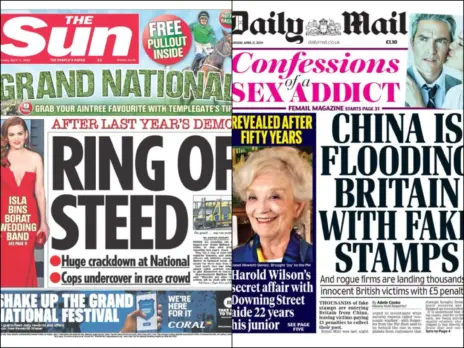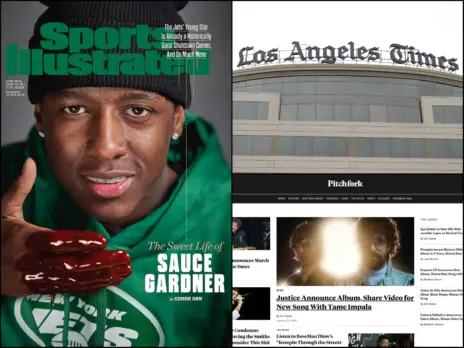
The Sun's former deputy news editor told a court it is "very standard journalistic practice" to invent quotes.
Ben O'Driscoll, 38, in Kingston Crown Court's Sun six trial, said reporters would be "huffy" if asked for the source of their stories.
O'Driscoll also revealed that he was given "two minutes" by his editor to leave the building on his last day before leaving The Sun for a rival.
He said yesterday that it is wrong to pay public officials for confidential information unless it is in "exceptional circumstances".
He said the newspaper had paid police officers for stories and that any disclosure by a public official to the press should be in the public interest.
He denied that there was a culture of paying police officers, army officials and Broadmoor workers for leaks at The Sun. And he said he was unaware of any policy at the tabloid of handing over cash for confidential information.
"It would have to be in exceptional circumstances," he said. "If a public official is divulging confidential information for money, unless there's an overriding public interest, it's wrong."
Later, O'Driscoll said journalists are "entitled" to pay police officers for leaks if the information is in the public interest and not confidential.
He said he wanted to expose wrongdoing in public bodies that would sometimes outweigh the loss of trust in the officer selling the information.
Judge Marks asked him: "If you had known that people that were being paid for information were public officials, would you have acquiesced to that, provided the story was not confidential and in the public interest?"
O'Driscoll replied: "Yes, provided they were in the public interest."
Oliver Glasgow, prosecuting, asked: "So there's nothing wrong with paying a police officer for him to sell information to a newspaper, provided you decided it was in the public interest and the material was not confidential?"
"It would be the editor's decision," replied O'Driscoll.
"If I felt it was strongly in the public interest, I would feel it would be something a journalist would be entitled to do.
"It would have to be very strongly in the public interest."
Glasgow asked: "You think it's acceptable for the public's trust in a police officer to be destroyed provided you think the story is worth it?"
O'Driscoll replied: "If it's in the public interest, (damage to) the trust of the police officer is acceptable in terms of the public trust being damaged by the information not coming out."
He added: "I'm happy to pay for these stories."
Pyatt source denial
O'Driscoll accepted Sun reporter Jamie Pyatt had been paying Pc Simon Quinn for information, but denies knowing that was happening.
He said no reporter had ever revealed details of meetings with public official sources, and said they would be "huffy" if questioned about their contacts.
"During your time, in your opinion was there a culture at The Sun of paying public officials for confidential information?" asked Martin Hicks QC.
O'Driscoll, who was The Sun's deputy news editor between 2006 and 2011 before moving to the Daily Mail, replied: "Absolutely not."
Hicks asked: "Was there a policy by The Sun for staff to do so?"
O'Driscoll told the court: "As far as I know, absolutely not."
He is on trial accused of conspiracy to commit misconduct in public office by paying Pc Quinn, another serving police officer and Broadmoor healthcare assistant Robert Neave for stories that were published in The Sun.
He is in the dock with The Sun's former managing editor Graham Dudman, 51, head of news Chris Pharo, 45, reporters John Troup, 49, and Pyatt, 51, and picture editor John Edwards, 50, who all face similar corruption charges.
Pyatt told the jury he kept O'Driscoll and Pharo fully informed of his activities, amid a culture of paying public officials for stories that were in the public interest.
But O'Driscoll has accused his former colleague of lying in his evidence.
Pyatt suggested he had revealed that he was meeting Pc Quinn to obtain details about a rape case involving two detectives.
But O'Driscoll replied: "He certainly didn't tell me and I would extremely surprised if he had told Mr Pharo.
"He certainly didn't tell me."
'Huffy'
Nigel Rumfitt QC, for Pharo, asked: "Did he ever tell you anything like that?" O'Driscoll replied: "Never."
He added: "Journalists at The Sun would get very huffy if you asked questions of their sources."
O'Driscoll told the court he had not received a memo Pyatt claimed he had sent detailing his contact with Neave who handed over medical reports on the Yorkshire Ripper.
Pyatt suggested in December 2010 he had landed a scoop about Ann Summers boss Jacqueline Gold being poisoned by her nanny, telling O'Driscoll it had come from a "police contact".
"It could have meant any number of things," O'Driscoll told the court.
"He's not being clear where the story came from."
Hicks asked: "What weight did you attach to it?" O'Driscoll replied: "Very little."
When asked to approve a £1,000 payment to the source, O'Driscoll replied "No probs" on January 5, 2011.
But he told the court it was his last day at the paper, having handed in his notice and told to leave the building.
"The Sun asked me to leave, the editor didn't want me there anymore, and I was given two minutes to leave the office," he said.
"That might have been the last email I sent."
Quote invention: 'That's been happening for hundreds of years'
O'Driscoll said his editors rarely asked about the source of a story, as it would already have an official comment confirming it at the time he presented it at the news meeting.
Glasgow asked: "One of the ways you are able to attest to the accuracy of a story if it hasn't been confirmed by a public body is to say our man has a source on the inside who's given the following information."
O'Driscoll replied: "At that stage, mostly the editor will be scrutinising them for newsworthiness.
"It might seem like the most obvious question, but in my experience if it's a Broadmoor, army, or police story, it would already have an official comment."
He said journalists would sometimes invent quotes to "embellish" their stories, when in fact they did not have a source.
"I wouldn't say I'm content, you can't lay that on me, but that's been happening for hundreds of years," he said.
"There may be extra information the journalist has put in under a Broadmoor source quote, it's very standard journalistic practice I'm afraid."
O'Driscoll said he assumed Pyatt had a source inside Broadmoor, but told the court the emails the reporter sent explaining his contacts were irrelevant.
"Presumably at some point you said: 'Jamie, among all the junk emails I get, I'm also getting emails from you about your sources and I don't care about your sources'?" asked Glasgow.
O'Driscoll replied: "I wouldn't send an email that long."
He said information around the maximum security hospital could come from a variety of sources, including black cab drivers, but accepted he thought it was possible Pyatt had an informant who worked there.
But he dismissed Pyatt's emails about his contacts as "source boosting", and said the information did not affect him at all.
Glasgow said: "The emails have been a complete waste of time by the people who sent them to you and Chris Pharo?"
O'Driscoll replied: "Many of them have been."
Glasgow asked: "Why did you never say to the journalist, stop emailing me, I've got enough on my plate."
O'Driscoll replied: "I can't tell you, I just dealt with the other points in the emails."
Shown a story about murderer Daniel Gonzalez killing himself in Broadmoor, O'Driscoll argued the details could have come from sources outside the hospital.
"This is a big event at Broadmoor, one of the most notorious patients at Broadmoor, a known suicide risk and he managed to kill himself," he said.
"News of Gonzalez's death would have been all around, everyone knew about it, anyone could have told people."
When it was pointed out the Sun story included details of the time of the incident and the method of death, O'Driscoll said: "Information could still come out by anyone at Broadmoor, any staff, visitors go in, patients are allowed to call out – the information could have come from almost anywhere."
Glasgow asked: "Even the time his body was discovered would have been doing the rounds in the local area?"
O'Driscoll replied: "Absolutely, it only takes one member of staff to tell one person and news in that area would travel very fast."
He conceded that cash payments, which were authorised by the editor, had to "go through me before it could progress up the line".
'Pricing'
He and Pharo both argue they were "pricing" stories rather than approving cash payments.
Asked why he had not given an explanation to police, O'Driscoll said he relied on legal advice but did not think he could help the investigation.
"I chose to say 'no comment' to every question which was the advice of my lawyer at the time," he said.
"I was allowed to look at the evidence they had, and my view was there was nothing remotely confidential in any of the evidence.
"I didn't think I could help the police."
Challenged on his assertion that he could not help, O'Driscoll added: "Maybe I phrased it poorly, but I said no comment because I thought I would deal with them and go back to my desk at the Daily Mail and go back to my working life."
Pharo, of Wapping, east London, denies four counts of conspiracy to commit misconduct in public office.
O'Driscoll, of Windsor, Berkshire, and Dudman, of Brentwood, Essex, both deny three counts of conspiracy to commit misconduct in public office.
Edwards, of Hutton, Brentwood, Essex, and Pyatt, of Windsor deny two counts of conspiracy to commit misconduct in public office.
Troup, of Saffron Walden, Essex, denies one charge of misconduct in public office.
All six defendants have been cleared of an overarching conspiracy to pay public officials, while Pharo has been found not guilty of paying a Sandhurst soldier.
The trial continues.
Email pged@pressgazette.co.uk to point out mistakes, provide story tips or send in a letter for publication on our "Letters Page" blog







